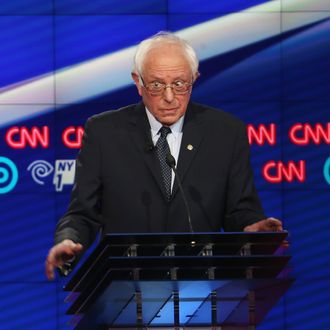
It was difficult to focus on substance in the first half of Thursday night’s Democratic debate because the howling factions of the audience interacted with a nasty undertone from the candidates to produce an atmosphere far more like the notorious slugfests the Republicans put on until Donald Trump brought them to a merciful end. In an interchange with some colleagues, I missed a few exchanges while formulating a proposal to ban live audiences in presidential debates.
Eventually, the candidates engaged in one fundamental point of philosophy and two big foreign-policy differences. It’s been around all along, but tonight’s debate really cast a spotlight on the apparent belief of Sanders and his supporters that taking money from “the enemy” — Wall Street and fossil-fuel interests, in particular — fatally taints a politician, while Clinton represents the view that such contributions represent hedge money the bad guys spend knowing they can only cushion the public-policy blows at best.
It’s the difference between those who fear Clinton’s sold her soul and those who think that, like Barack Obama, she’s taken corporate America to the cleaners. And it’s not a difference of opinion either side will easily give up. If anyone won a point across this vast psychological gulf, it was probably Sanders for the simple reason that Clinton cannot explain or defend her refusal to release transcripts of her paid Wall Street speeches.
The surprisingly sharp foreign-policy differences involved Libya and Israel. It’s clear Barack Obama gave Bernie Sanders a big gift with his comment on the absence of post-Qaddafi Libya planning being the worst mistake of his administration. Sanders skillfully exploited the opening by comparing Clinton’s posture on Libya to her “lack of judgment” on Iraq. She was driven to blaming the problems in Libya on the Libyans and on Obama — not a good way out of her own responsibility.
But Sanders returned the favor by insisting on an endless exchange on Israel and Palestine that seemed designed to offend supporters of Israel in one of the worst states in the country for doing that. It will not be lost on Zionist Democrats that Sanders echoed Donald Trump’s “honest broker” stance on maintaining distance from Israel, while Clinton was effective in citing her own extensive experience in Israeli-Palestinian diplomacy.
The candidates also unveiled a difference of opinion over NATO — Sanders is apparently for unilateral U.S. funding cuts while Clinton is not — which may not matter unless Sanders makes it to a general election.
Speaking of which, it’s hard to judge whether the back-and-forth between the two candidates about what their campaigns represent — delivered amidst a return to the horrid shrieking and chanting from the audience — will matter in the long run. Sanders seems to be trying out an argument that Clinton’s nomination-contest victories are irrelevant because they happened at the wrong time (early in the process), the wrong place (the South), or with the wrong supporters (old Democrats rather than young independents).
If he goes over the brink into a claim that a pledged-delegate victory by Clinton is illegitimate, the Democratic convention could be nearly as divisive as the Republican confab looks sure to become. After tonight, the superior unity of Democrats is at least partially in question for the first time.






























